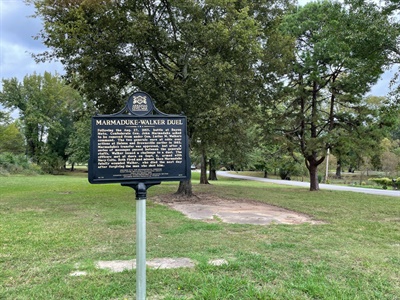On September 6, 1863, Confederate brigadier generals John Sappington Marmaduke and Lucius Marshall Walker participated in one of the most famous duels during the American Civil War. It took place about seven miles from Little Rock, Arkansas and resulted in the death of one of these men.
John S. Marmaduke was from Missouri and a graduate of West Point who had served in the U.S. Military before the Civil War. After being wounded at Shiloh, he was promoted to Brigadier General and served at Prairie Grove and Helena.
Lucius M. Walker lived in St. Francis County, Arkansas and was a nephew of President James K. Polk. He had also graduated from West Point and served in the U.S. Army before becoming a farmer. Walker help form a regiment once the Civil War began and was appointed Brigadier General on March 11, 1862, but sickness kept him out of Shiloh. He was transferred west and served at Helena.
It was at the Battle of Helena on July 4, 1863, that the two parties began to differ. General Marmaduke blamed Walker for not coming to his assistance during the battle. This difference would lead to an open wound between the men which would fester and only get worse. That wound reopened on September 2nd after the Battle of Reed’s Bridge during the campaign for Little Rock. General Price had ordered Marmaduke, in August, to join forces with Walker at Brownsville. Since Walker was senior in appointment, he took command of the cavalry. This further angered Marmaduke. After being defeated by Federal horsemen at Brownsville, Price ordered the two men to concentrate their forces at Reed’s Bridge on Bayou Meto. On August 27, Federal and Confederate forces clashed around Reed’s Bridge. Although the rebels delayed the Federal advance, they were ordered to withdraw back closer to Little Rock. It was then that a series of messages were sent back and forth between the two men and their aides. In one message, Walker accused Marmaduke of saying he was a coward. In another, Marmaduke said he would no longer serve under an officer like Walker. Their aides, Captain John C. Moore for Marmaduke, and Colonel Robert H. Crockett for Walker, then got involved. Crockett challenged Marmaduke on Walker’s behalf, without talking to Walker first. Moore accepted the challenge on behalf of Marmaduke. They then set the terms of the duel, without either one of the contestants there. General Price attempted to stop the duel by ordering the two men to stay at their posts, but Walker did not receive the message and Marmaduke ignored it. The duel was on.
The two contestants, their aides Crockett and Moore, along with several others met at a nearby plantation on September 6, 1863. At fifteen paces, both fired and missed. On the second shot, Marmaduke fatally wounded Walker who would die the next day in Little Rock. Although arrested by Price, Marmaduke was never tried for murder and would eventually return to the army and be promoted to major general. After the war, he would serve as governor of Missouri. Before Walker died, he learned of the birth of his son. He is buried in Memphis. Thus ended the strange saga of a duel between two generals during a war.
Sources:
M.V. Bowks de la Rosa. University of Maryland. "Marmaduke-Walker Duel" 2015. Retrieved October 18, 2021. Encyclopedia of Arkansas
Bender, Robert Patrick. Eastern New Mexico University-Roswell. "Lucius Marshall (Marsh) Walker (1829-1863)"2020. Retrieved October 18, 2021. Encyclopedia of Arkansas
Polston, Mike. "John Sappington Marmaduke (1833-1887)"2015. Retrieved October 18, 2021. Encyclopedia of Arkansas
Washington Telegraph (Washington, Arkansas) 21 October 1863. Wed. Page 2